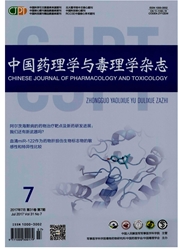

 中文摘要:
中文摘要:
金属硫蛋白( MT)是一类富含半胱氨酸残基的低分子量金属连接蛋白。在中枢神经系统中主要有MT-Ⅰ,Ⅱ和Ⅲ亚型。 MT可广泛参与中枢神经系统的神经细胞生长、自主防御反应、免疫调节和脑损伤修复等活动。 MT具有清除自由基、调节脑细胞离子稳态、重金属解毒、抗炎症和抗细胞凋亡等多种重要生物学功能。脑缺血应激可显著诱导脑组织细胞MT的表达。近年来越来越多的研究表明, MT对脑缺血损伤具有重要保护作用,有可能成为预防和(或)治疗脑缺血疾病的重要靶点。本文简要综述中枢神经系统中MT的表达与调控特点以及脑缺血应激对MT表达的影响,重点讨论MT对脑缺血损伤的保护作用及其可能机制。
 英文摘要:
英文摘要:
Metallothionein ( MT ) is a cysteine-rich and low-molecular metal binding protein. Three isoforms of MT have been found in the central nervous system, including MT-Ⅰ, Ⅱ, and Ⅲ. MT is widely involved in many critical activities in the central nervous system, such as neuronal growth, auto-defensive reaction, immune-regulation, and repair of cerebral injury. MT exerts many important biological functions like scavenging of free radicals, regulation of ion homeostasis in brain cells, detoxification of heavy metals, anti-inflammation, and anti-apoptosis. Recently, MT has been increasingly shown to have protective effects against cerebral ischemia. MT promises to be an important target for prevention and/or treatment of cerebral ischemic disease. ln this review, the expression and regulation characteristics, and the effect of cerebral ischemic stress on MT expression have been summarized, with focus on the neuro-protective effect of MT and its possible underlying mechanisms.
 同期刊论文项目
同期刊论文项目
 同项目期刊论文
同项目期刊论文
 Cardioprotection against doxorubicin by metallothionein Is associated with preservation of mitochond
Cardioprotection against doxorubicin by metallothionein Is associated with preservation of mitochond 期刊信息
期刊信息
